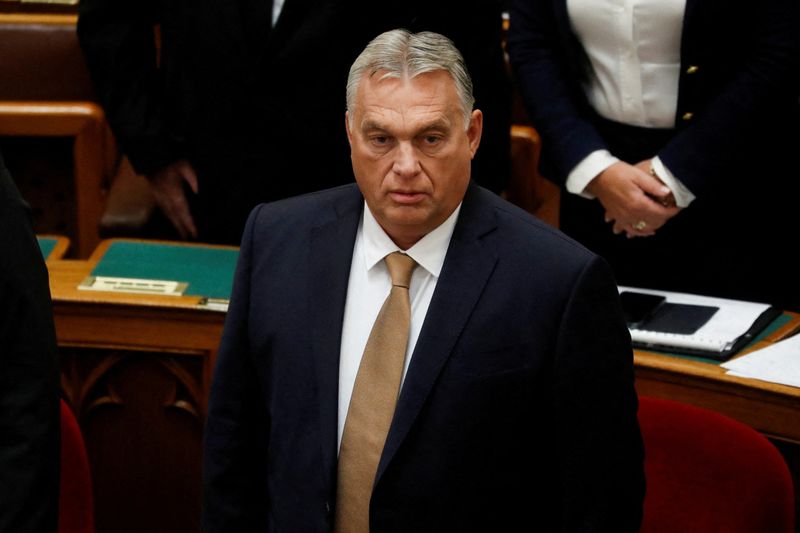By Gabriela Baczynska and John Chalmers
BRUSSELS (Reuters) - The European Union was haggling with Hungary on Friday over releasing billions of euros in aid in exchange for Budapest revoking its veto on extending a joint loan to Ukraine and acceding to a minimum global tax.
The EU's executive reiterated that recent changes to improve anti-corruption safeguards in Hungary did not resolve concerns about the state of democracy in the country, or warrant handing over up to 13.3 billion euros ($14 bln) worth of funds.
However, the European Commission left open the possibility that the bloc's other 26 member states might reward Budapest for its latest moves to address long-standing concerns when they make a final decision.
Trying to unlock access to the money, Hungary's nationalist Prime Minister Viktor Orban is facing one of the greatest challenges of his 12-year rule as domestic inflation is seen climbing to 26% this month, the cost of servicing state debt has shot up and the economy is expected to slow sharply next year.
The EU has blocked the funds over worries around corruption and poor judicial independence in Hungary, which in turn vetoed the EU loan to Kyiv and a proposal for a global corporate tax.
"I note the efforts made so far by Hungary to address several of the remedial measures," EU Budget Commissioner Johannes Hahn wrote in a letter.
"The overall risk for the (Europe) Union's budget remains unchanged... this has not changed in the light of the latest legislative changes adopted in Hungary."
A senior EU diplomat worried that the planned approval later on Friday of new sanctions against Russia for waging war on Ukraine might become another policy to be highjacked by the intensifying tug-of-war.
Orban, in power since 2010, has cultivated close ties with Moscow and repeatedly stalled EU sanctions against Russia. The self-styled "illiberal" crusader has fought with EU partners over media and academic freedoms, migrant and LGBT rights.
International watchdogs say Orban has long channelled EU funds to associates to entrench himself in power. Orban says Hungary is no more corrupt than others.
PRESSURE GROWING
Sources said EU countries could look to Hungary's latest legal changes to conditionally approve Budapest's national recovery spending plan worth 5.8 billion euros and lower from 7.5 billion the value of other funds to be frozen.
That discussion was only to happen on Monday, the sources said, adding that any decision on funds for Hungary would also depend on whether Budapest moves on the two blocked files.
The complex puzzle might end up at the top EU level when the bloc's 27 national leaders including Orban meet on Dec. 15-16.
With Hungary's forint currency down 11% versus the euro this year, Orban has sought to strike a deal with the Commission, creating an anti-graft agency to unlock the EU funds, among others.
But the Commission said that was not enough, recommending freezing 7.5 billion euros, or 65% of the development funds assigned to Hungary from the EU budget until the end of 2027, over corruption risks.

It has also been withholding approval of some 5.8 billion euros for Hungary from an EU fund set up to help countries recover from the COVID pandemic, citing insufficient independence of courts from politicians.
An end-of-year deadline increases the pressure as both sides seek to wring concessions. ($1 = 0.9492 euros)